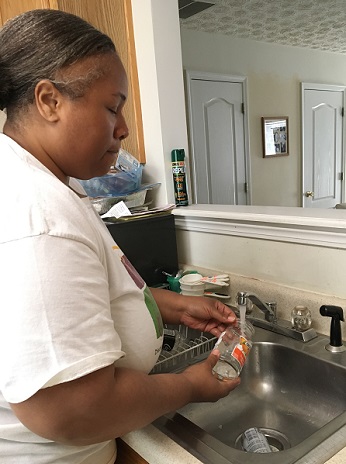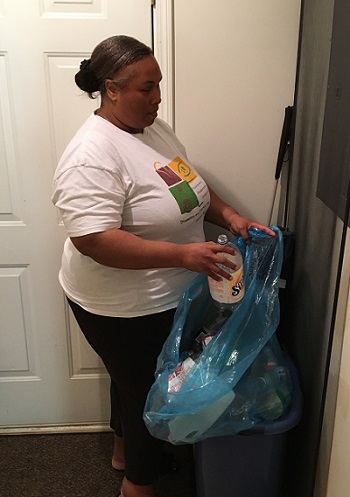Editor’s note: April 22 is Earth Day. Each year, Earth Day marks the anniversary of the birth of the modern environmental movement in 1970. Growing out of the first Earth Day, the Earth Day Network is the world’s largest recruiter to the environmental movement working with more than 50,000 partners in nearly 195 countries to build environmental democracy; 2020 marks the 50th anniversary of the first Earth Day. In honor of this milestone, Earth Day Network is launching a set of goals to shape the future of 21st century environmentalism.
“Waste Not, Want Not”

From the time I was a little girl, I was aware of the importance of not being wasteful and recycling. My parents and grandparents would reuse old household items. Things like jelly jars would easily substitute as drinking glasses. Old brown paper grocery bags would be reused to cover my school paperback books to keep them from damage. My parents would also take bags of old clothes and furniture to donate them to nonprofits like Goodwill and the Salvation Army. So, as we get ready to celebrate Earth Day on April 22nd, I reflect on my childhood. I realized that I still practice many of these things and more. But instead of observing one day annually, I honor Earth Day every day. I feel it is important that I do what I can to protect the planet that I live on. I know that I can’t do everything, but I can do somethings. I don’t allow my visual disability to stop me from participating in this significant event. So, you might be thinking what can you do to help the planet? How can a visually impaired person fully participate in honoring Earth Day every day? You have asked the right questions to the right person. I encourage you to check out my list of things I do as part of my life routine.
My Checklist for Recycling

I participate in my county recycling program. A couple of years ago, my county launched a recycling program that was free. I received a flyer in my water bill and signed up immediately. What I got was a box of blue recycle bags for plastic bottles, metal cans, and glass jars. I also got a blue storage container for paper, like junk mail, newspapers, cardboard, and other paper materials. I have labeled these for easy identification. From time-to-time, I even shred confidential documents like medical records, credit card, and bank statements and place them in the blue recycle bags. When my bag or storage container fills up, I take them to my driveway, and they are picked up by my county’s sanitation department.
I use cloth earth bags for grocery shopping. These bags work better than the plastic ones that you get in the store. Plastic bags are filling our landfills and don’t decompose well. When I use my cloth earth bags, I have a lot more room for my purchases, and I can use them over and over again. I even have a couple with insulation for when I get refrigerated or frozen foods, and it keeps the food cold until I get it home. I keep them handy by hanging them on the door knob of my pantry door in my kitchen, so they are always ready to go when I leave for shopping. Using earth bags greatly reduces the amount of plastic that I consume thus helping the planet.
I take old computers and electronics to a recycle center. I don’t place these items in the trash. Taking items like this to a recycle center is better because they will be properly disposed of. Just be sure with computers you clean off your hard drive first.
For electronics related to vision loss, I do things a little differently. In the past, I have sold old assistive technology devices instead of throwing them away or letting them collect dust. Items like old talking dictionaries, Victor Readers, CCTVs (video magnifiers) and braille note takers sometimes can still be used again by persons who are blind or visually impaired. If they can’t be sold, depending on their condition, they can be donated to a vision rehabilitation center. I have also given my old white canes and cane parts to a local orientation and mobility instructor who takes my donations and uses them for people who can’t afford a white cane.
When it comes to old clothes, I donate to a couple of nonprofits. Professional clothes such as blouses, skirts, slacks, and suits, I donate to “Dress for Success” because they help low income women get on their feet and return to work. They have even worked with blind and visually impaired women. I also donate clothes and household items to the American Kidney Fund because they will come to my home to pick up items. I donate furniture to the Salvation Army and Friends of Disabled Adults and Children. I like donating items to nonprofits that have been around for a long time and who also assist people with disabilities in my local community.
I use rechargeable batteries. I use these kinds of batteries especially for my talking clocks and various TV and DVD remote controls. Rechargeable batteries not only help the environment but also save me money by not having to purchase numerous batteries over and over again.
My list is not exhaustive. There are probably a ton of more things that can be done to honor Earth Day. But I think my list is a great way to get started in helping our planet and others too. I am sure after reading it you might realize that you are already doing some of these things. Or you might realize that maybe you can add some of my suggestions to your life too. Regardless, it’s time we honor Earth Day every day!
Resources for Earth Day for Individuals with Vision Loss
How Labeling and Marking Can Help You Recycle
Gardening and Yard Work Tips for Individuals Who Are Blind or Visually Impaired
Raised Bed Gardening, An Easy Alternative for Gardeners with Vision Loss